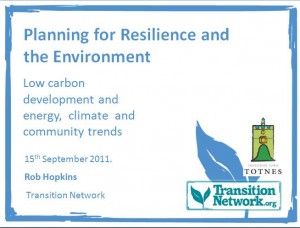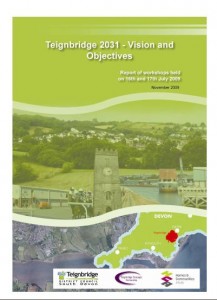20 Sep 2011
How questioning economic growth left me feeling like a “Pilgrim from the 25th Century”
 In 1968, according to Immigration Department papers found on a rubbish dump near London 18 years later, Captain Beefheart and his Magic Band arrived at Heathrow Airport. Their inept manager had booked them a series of gigs in the UK, but had overlooked to arrange work visas. As a deeply eccentric, highly individual group who had previously only played the West Coast of the US, to say they stood out like a sore thumb in drab, late 1960s England, would be an understatement. According to the Immigration Department papers, “the group arrived together and presented a very strange appearance, being attired in clothing ranging from ‘jeans’ to purple trousers with shirts of various hues, and wearing headgear varying from conical witches hats to a brilliant yellow safety helmet of the type worn by construction workers…. when they eventually approached the desks, it proved somewhat difficult to interview them, as they appeared to think on a completely different mental plane and found it difficult to grasp the rudiments of a passport control”. When Immigration Officers asked Beefheart who they were, he replied that they were “pilgrims from the 25th century” and that the camera around his neck was a member of the group. I experienced something akin to this feeling of complete otherness last week when I spoke at an event about Newton Abbott’s Development Plan, as the only one really questioning the whole process’s underlying assumptions.
In 1968, according to Immigration Department papers found on a rubbish dump near London 18 years later, Captain Beefheart and his Magic Band arrived at Heathrow Airport. Their inept manager had booked them a series of gigs in the UK, but had overlooked to arrange work visas. As a deeply eccentric, highly individual group who had previously only played the West Coast of the US, to say they stood out like a sore thumb in drab, late 1960s England, would be an understatement. According to the Immigration Department papers, “the group arrived together and presented a very strange appearance, being attired in clothing ranging from ‘jeans’ to purple trousers with shirts of various hues, and wearing headgear varying from conical witches hats to a brilliant yellow safety helmet of the type worn by construction workers…. when they eventually approached the desks, it proved somewhat difficult to interview them, as they appeared to think on a completely different mental plane and found it difficult to grasp the rudiments of a passport control”. When Immigration Officers asked Beefheart who they were, he replied that they were “pilgrims from the 25th century” and that the camera around his neck was a member of the group. I experienced something akin to this feeling of complete otherness last week when I spoke at an event about Newton Abbott’s Development Plan, as the only one really questioning the whole process’s underlying assumptions.
 Newton Abbot is Totnes’ neighbouring town, with a population of around 25,000. Teignbridge District Council are presently conducting a development planning process, creating the template for the town’s development over the next 20 years. A public event was held at the Courtenay Centre in the town to explore some of the issues raised by the planning process. There were a few of us speaking, a local businessman who talked about the need to create new, and ideally greener, jobs. There was a great talk by a woman from the Devon Strategic Housing Group which set out the near-impossibility of anyone under 40 actually being able to afford, bar having an inheritance or a very well-paid job (the average income in the town is £25,444), to buy a house. It was a stark reminder of what she referred to as the ‘generation gap’ in terms of those with, or without, equity in property.
Newton Abbot is Totnes’ neighbouring town, with a population of around 25,000. Teignbridge District Council are presently conducting a development planning process, creating the template for the town’s development over the next 20 years. A public event was held at the Courtenay Centre in the town to explore some of the issues raised by the planning process. There were a few of us speaking, a local businessman who talked about the need to create new, and ideally greener, jobs. There was a great talk by a woman from the Devon Strategic Housing Group which set out the near-impossibility of anyone under 40 actually being able to afford, bar having an inheritance or a very well-paid job (the average income in the town is £25,444), to buy a house. It was a stark reminder of what she referred to as the ‘generation gap’ in terms of those with, or without, equity in property.
I started my presentation with a recent quote from Mervyn King, Governor of the Bank of England:
“It is not like an ordinary recession where you lose output and get it back quickly. You may not get it back for many years, if ever, and that is a big long-run loss of living standards for all people in this country.”
 I then talked about peak oil, and about climate change, arguing that these three challenges are central to any form of planning for the future. I referred to the recent Lloyds/Chatham House report which concluded that “…energy security is now inseparable from the transition to a low-carbon economy and business plans should prepare for this new reality”. I referred to the recent report by the World Economic Forum, identifying the key risks that need to be central in peoples’ minds for the next 10 years, and how they supported the assertion that these are our key three risks (see above).
I then talked about peak oil, and about climate change, arguing that these three challenges are central to any form of planning for the future. I referred to the recent Lloyds/Chatham House report which concluded that “…energy security is now inseparable from the transition to a low-carbon economy and business plans should prepare for this new reality”. I referred to the recent report by the World Economic Forum, identifying the key risks that need to be central in peoples’ minds for the next 10 years, and how they supported the assertion that these are our key three risks (see above).
 If you are planning for next 10-20 years of the town and its surroundings, what is vital, I said, is that it is done based on realistic assumptions. If your assumptions are that in 10 years time we’ll be ‘back to growth’, with more cars, more finance, more cheap energy than today, then such assumptions are deeply reckless and irresponsible. I talked a bit about what Transition Town Totnes is doing, and about how any plan for the future must be based as much on plugging the leaks of the local economy as on attracting new businesses.
If you are planning for next 10-20 years of the town and its surroundings, what is vital, I said, is that it is done based on realistic assumptions. If your assumptions are that in 10 years time we’ll be ‘back to growth’, with more cars, more finance, more cheap energy than today, then such assumptions are deeply reckless and irresponsible. I talked a bit about what Transition Town Totnes is doing, and about how any plan for the future must be based as much on plugging the leaks of the local economy as on attracting new businesses.
Teignbridge District Council are talking about the need to bring 28.5 hectares of new employment land into use, to create 41,000sqm of non-food shopping floor space, and to create 114 new affordable homes a year. But what, I asked, are the assumptions that underpin this? Economic growth is, to all intents and purposes, over and done with, the focus now should be on creating a post-growth economy for Newton Abbot, one based around skills, jobs and training, around meeting more local needs locally, and on happiness and wellbeing.
Well, it was a message that was well received by those in the audience, I saw lots of nodding heads as I spoke (unless they were just trying to stop themselves falling asleep). What was so interesting was the next two speakers, especially the district’s Economic Development Officer. “Well I don’t know about you”, she began by jauntily telling the audience, “but after those last two speakers I thought I wanted to kill myself! But there is plenty of good news about Newton Abbot and I’m here to tell you about it”. She then went on to wax lyrical about what a great mix of shops it has, what great car parks, how people come from great distances for the shopping experience the town offers. The assumptions shifted back to a future of more shops, more cars, more spending, more growth.
Well fair enough perhaps, it is after all her job to talk up economic growth, and perhaps it is because I am half way through reading Richard Heinberg’s new masterpiece, ‘The End of Growth’, but it seemed absurd to me. A few days before I had been listening to the BBC Radio 4 6’o’clock news, which had been about how youth unemployment in the UK had risen sharply, how EU ministers were openly suggesting that the whole European Union experiment might be coming unstuck due to the Euro debt crisis, and other tales of economic woe that seemed to come in relentless waves. One business leader commenting on the UK youth unemployment figures, said “these aren’t the kind of figures you see in a recovery, these are recession figures”. On some level with me, it felt like that bit in ‘Titanic’, where the sinking ship groans as it reaches a point of no return. This was the gut feeling I still had as I sat in the Newton Abbot meeting. I was also still absorbing a new article by Chris Skrebowski in which he redefined what we mean by peak oil, so that it referred to the point when “the cost of incremental supply exceeds the price economies can pay without destroying growth at a given point in time”. That feels rather like now to me.
 The senior planner for the Council spoke last, and talked about how this would be a plan for jobs and growth (“your plan”) and how exciting it all was. He showed the process whereby the land needed had been identified to the south and west of the town. There was much talk of the need to ‘balance’ the needs of the environment alongside the need for employment, housing and so on. The document prepared by the Council that we were given talked about climate change, “diminishing natural resources” and food security as “overarching sustainability considerations”, and spoke of building “local resilience to climate change”. There were many good words in the document and in what he said, but the reality is that this is a plan based on the assumption that in the future we can expect just more of the same of what we had in the past, whereas most of the indicators are that we are moving into a very different world, a very different terrain.
The senior planner for the Council spoke last, and talked about how this would be a plan for jobs and growth (“your plan”) and how exciting it all was. He showed the process whereby the land needed had been identified to the south and west of the town. There was much talk of the need to ‘balance’ the needs of the environment alongside the need for employment, housing and so on. The document prepared by the Council that we were given talked about climate change, “diminishing natural resources” and food security as “overarching sustainability considerations”, and spoke of building “local resilience to climate change”. There were many good words in the document and in what he said, but the reality is that this is a plan based on the assumption that in the future we can expect just more of the same of what we had in the past, whereas most of the indicators are that we are moving into a very different world, a very different terrain.
To be fair to the Council, they have an impossible job. Central government has told them how many new houses and how much new business space they need to get in place, and if the Council doesn’t figure where that is going to go then central government will intervene and tell them. The current administration has adopted an assumption in favour of development, and is going all out based on the assumption that the thing that will get us out of recession is the construction industry (because of course it worked really well in Ireland, Spain and Greece). As George Monbiot brilliantly pointed out recently, all development is now assumed to be ‘sustainable development’.
“The wrecking ball swinging from this chain is the government’s redefinition of sustainable development. “Development means growth”, the new document says, and “without growth, a sustainable future cannot be achieved.” All development thereby becomes sustainable, and all sustainable development must be approved. “A presumption in favour of sustainable development”, the draft insists, must be “the basis for every plan, and every decision … the default answer to development proposals is ‘yes’”.”
The new government’s definition of what constitutes ‘sustainable development’ now includes motorway service stations, roads to the airport and advertising hoardings. Clearly the Council’s hands are largely tied, and the extent to which such a process can be a genuine public consultation is debatable, as was evidenced by the fact that a 2 hour and 15 minute meeting contained just 10 minutes for questions from the audience. Yet, it stuck me there is something that they could do.
They could stop looking at ‘environment’ as being a stand-alone box which refers to protecting things, heritage and increasing recycling rates, and instead replace it with the concept of ‘resilience’, in such a way that it runs through everything. At the moment, the thinking goes like this, “we need houses. So we’ll get developers to come in and build them, and make sure that they do so in a way that respects the environment’. But how would it be if rather than skills, training, employment, the creation of local businesses being in separate boxes from ‘environment’, resilience thinking meant that every development of houses were asked to do as many other things as possible alongside the actual building of houses?
If each new development of housing used local materials, such as strawbale walls (the town is surrounded by some fine farmland), clay plasters (Newton Abbot is famous for its nearby ball clay deposits), local stone (similarly, there are good quarries nearby)? If each development offered the opportunity, given the nature of the materials used, to train local young people, and get the long-term unemployed involved? If this allowed much more of the money put into the development to stay and cycle locally. If it allowed the town to become a centre for research into the practicalities of a post-growth economy?
 If the houses that were produced were therefore more affordable, cheaper to heat, more beautiful, and ultimately, could be returned safely to the earth when future generations were done with them? In permaculture we call this kind of thinking ‘Multiple Function’, getting each element of a design to do as many things as possible. Bringing this thinking to a plan such as Newton Abbot’s would revolutionise the whole process, something that Transition Newton Abbot are trying to do.
If the houses that were produced were therefore more affordable, cheaper to heat, more beautiful, and ultimately, could be returned safely to the earth when future generations were done with them? In permaculture we call this kind of thinking ‘Multiple Function’, getting each element of a design to do as many things as possible. Bringing this thinking to a plan such as Newton Abbot’s would revolutionise the whole process, something that Transition Newton Abbot are trying to do.
Yet, when the reaction of the town’s Economic Development Officer to the idea that growth and cheap energy can no longer be relied on is “”Well I don’t know about you, but after those last two speakers I thought I wanted to kill myself!”, clear thinking about the future becomes that much harder. Economic growth is a glittering prize that it takes a big step to stand apart from. To be the first person in any given situation to question it as an assumption is to risk being seen in the same way the Magic Band were at Heathrow Airport in 1968. While the reflections and discussion in the limited question time at the end of the evening showed that many people in the audience shared these concerns, sat on the panel I felt increasingly like Beefheart’s “pilgrim from the 25th century”. Yet it is vital that we continue not to just question this shared assumption, but that we propose imaginative yet entirely workable alternatives, ones that actually tick more of the desired boxes than what is currently being proposed does.
The Beefheart story comes from the excellent ‘Captain Beefheart’ by Mick Barnes (Omnibus Press, 2000).
bob Irving
20 Sep 8:08am
But, Rob, you didn’t give them the resilience part, as far as I can see. You only gave them the doom and gloom, which prophesies a future that is so far out of their experience that they just can’t deal with it.
Kieran
20 Sep 8:42am
Over on the Archdruid Report comments section a few people have started talking about how the general public’s response to hearing that growth will end follows the Kübler-Ross model.
And most people are still sitting at the “denial” stage. At some point, eventually, they will reach “acceptance”.
Rob
20 Sep 8:48am
Hi Bob… no, I did do, the rest of my talk looked at the Transition approach, localisation, examples from other places and what they could do… the doom and gloom was all over and done with in the first quarter of the talk! That’s why the economic officer’s response was so fascinating…
Mike Grenville
20 Sep 9:57am
I remember that visit of Captain Beefheart though sadly didn’t get to any of the gigs. We’re all brothers on tomorrow….
http://youtu.be/Wkh-Dpifp2s
Andrew Ramponi
20 Sep 11:17am
The question I have after reading this Rob is, how much time and energy do you put into trying to get others to seriously look at growth/oil/or whatever issues that Transition might encompass?
In classic economic terms, does the marginal cost of your time and energy create a greater marginal benefit?
The easy thing about Transition I think is that there are no real black and white (speaking for myself)rules – who doesn’t use money and hydrocarbons? The hard thing is that when there are no real rules, anything might go. So enters the messy business of politics and cynicism.
Perhaps enjoying yourself and staying objective whilst in the process, whatever it might be, is the best test of good value and return on your investment. If it does this, and keeps you sustained and well nourished in other ways keep on doing it. You never know who might be listening.
David Lyons
20 Sep 12:42pm
Thanks for this Rob – you summarise how most of us feel every day – it is good to know that you feel the same frustration.
Further to Andrew’s comment about having fun, we can turn the frustration into fun by seeing the humour in the craziness of the situation – and turn it to our advantage: how about a transition pantomime/street theatre/comedy serial about govenment/council planners planning for business as usual – ‘how do the deck chairs look facing this way….’ and the poor number crunching clerk presenting the financial forecast to your Economic Development Officer…. ‘…how can we present the opportunities here….: the sun’ll come out..tomorrow…tomorrow (Pollyanna style).
I am not active in drama – but there could be some great material here!
David in Haddenham
Judy Fraser
20 Sep 3:14pm
Reading your post as I deliberate on what to say at a city council meeting here in Virginia about a proposed development – I can already hear the economic development authority sounding just like your officer, and feel the Titanic sensation. I will strive to emulate your clear headedness and determination! Thanks for posting your experience.
Lynn Laws
20 Sep 3:51pm
Rob’s blog highlights current prevalent assumptions, which I’ll call: the runaway train. Using this analogy, I think our role in Transition is to create a new train with features that entice more and more folks to get on board, as Rob continues to do. Some folks may quickly abandon the runaway train for the new, resilient version, but many will not–cannot at this time. I think that’s human nature–to cling to the known, even when it doesn’t work any more, and fear the new, the unknown. (I’m living proof of that :o).
It’s good to think about this challenge, expect to encounter it and not be overwhelmed or taken aback when it arises. While the “leaders” in the forum during which Rob spoke, clung to the runaway train, he can’t know how many others in the audience and in other leadership roles where inspired by his presentation or may later reach for his hopeful vision. We can have compassion for those who cannot now abandon the runaway train and be grateful for Rob and others who hold a vision of truly sustainable, livable, vibrant communities.
Ruud Baanders
20 Sep 4:49pm
Rob,
I very much appreciate you sharing your experience as it is helpful to articulate myself in similar situations.
However, your article does also make me feel sad as I would like people like you to engage in a meaningful conversation with others.
To me, sharing scary data and following up with the “wisdom” of Transition Towns is not going to work.
When people experience that we want to make them feel “wrong” they become defensive and have lost any goodwill.
I prefer to engage with others to (help them) understand their motivation (needs) first, without me having an “enemy” image of them. Listening is the key to connection. Only when the connection is established it is time to share my/your perspective, my/your concerns and motivation. Next step is talking about solutions.
I love the quote “connection before education”!
Ruud
Dianne Conduit
20 Sep 6:30pm
Rob
As a resident of Newton Abbot I was at the meeting and you are spot on, I felt exactly the same. I was every excited to hear the hints of the new types of economy / business, your inspiring talk of how it could be with some great examples from elsewhere and the housing presentation but my heart sank when I heard about throwing up ‘tin sheds’ for business needs, the ‘need’ for more retail and business land and lots more housing development without any apparent relevance to all of the presentations before, no imagination, no creativity and no innovation! My interpretation was ‘lets find the easiest place to put this lot where there will be the fewest people to engage (pay lip service too)… job done!’. We do need to see the rationale behind the modeling on the following areas: business/economy both growth and sectors /industries, jobs, business land requirements and infrastructure, particularly roads. New housing needs to look and feel good, be low carbon, sustainable and durable which would be a great legacy to leave for the future. My biggest question is where does agriculture and farming, including managed woodlands, fit in to the new world given it has been the key strategic ‘industry’ in and around Newton Abbot for centuries; livestock market, dairy, sheep, wool, brewing etc have all been major industries in the past. With the increasing need to consider food security, green energy and the ability to increase sustainable building and living surely more land will be required to service this not less (and it will create new jobs too) and its prime agricultural land that is going to be the biggest loser in this equation. There was not a word about at the meeting e.g. agricultural ‘business development’ space required and where it might be sited. I was at a planning day for Newton Abbot yesterday which was more engaging, with some pockets of real vision but I fear the horse has bolted and development will happen with more of same poorly designed developments that we see all over the country, by stealth. I really hope I am proved wrong…. Come on Newton Abbot wake up to what is about to happen and get engaged!
Jim Newcomer
20 Sep 7:57pm
We will soon be facing a similar encounter with the facts, as it were, of political planning for growth here in Portland (Oregon, USA). The Bureau of Planning and Sustainability plans to release next week the final draft of the Portland Plan, which is meant to guide our city to prosperity and happiness over the next 20 years. Despite the 3 scenarios of our (famous) Peak Oil Task Force – business as usual, gradual energy descent, and a sudden plunge – the Portland Plan is based on blind hope for business and growth as usual – and a return to pre-recession assumptions.
Transition PDX is now weighing how to respond to this. One alternative is to testify, as you did, spitting into the wind of orthodoxy. Another is to write an alternative plan based on a more realistic appraisal of future conditions under all three scenarios. And a third might be to engage our whole green community in a long-term and public debate about what should be in our real Portland Plan – and write a final draft for inclusion in the city’s Comprehensive Plan, which is supposed to follow this exercise in a few years, or not. Either way we could press for a public decision and debate.
This is all to say that your experience in Newton Abbot – and your reporting of it – has given us a framework in which to anticipate our own actions and perhaps enter the arena a bit more prepared than we otherwise might have been. So thanks.
Nat
20 Sep 9:54pm
“Pilgrims from the 25th century”… I love it 🙂
The prospect of the end of growth is deeply unsettling to many and denial is a natural initial response. It took me a while to get my head around all the implications. However when talking about it around us, we should think about planting a seed in people’s mind and then come back later to see how well it’s grown. The Eurozone maelstrom is sure to help the process.
Tony Buck
21 Sep 1:23am
I live in Pennsylvania and have heard of and seen several regional business plans that have been funded. They must be happening all over the country as a response to the GREAT recession. Unfortunately they are all (BAU) business as usual. I think Nat’s idea of an alternative plan is the way to go. Because many people don’t really understand what we’re talking about when they come into it cold. I know time and funding are a challenge, but come on PDFers, we’ve got to do it – a kind of very down to earth Energy Descent re-localisation vision plan.
Amanda
21 Sep 10:18am
Keep going Pilgrim, you have a lot of followers.
Trugs
21 Sep 12:48pm
As ever Rob, you capture so well the experience Transitioners have on a daily basis. Just yesterday I attended a talk by the Chairman of the National Endowment for Science, Technology and the Arts (NESTA), Sir John Chisholm. He presented slides showing the history of innovation and spoke about the exponential rise of human populations and technology in the past 150 years with no mention of fossil hydrocarbons – attributing the rise to the rule of law, amongst other esoteric factors. I questioned this in plenary and by catching him later. His view ? Plenty more oil will be found ! Very worrying when someone responsible for innovation in this country appears to have no understanding of the context in which that innovation needs to occur. The event organisers didn’t seem happy that I dared to question (very politely,I might add) their keynote speaker’s assumptions…
Adrian
21 Sep 1:33pm
Very well articulated.
I have questioned economic growth in the odd public meeting. You get a stony silence usually – its feels like you walked in with dog doo doo on your shoes! Often you don’t get the time to explain your stance, but you had lots of time and explained it well – and they still could absorb it.
Its stunning and shocking when people don’t want to listen to rational and well grounded reasoning.
Currently it seems that politicians are frantically pulling levers trying to magically produce our ‘deserved’ economic growth, wasting precious time and energy when they should be preparing for a different future.
Tim Beadle
21 Sep 2:49pm
@Trugs
“Sir John is a Cambridge graduate who started work in the automobile industry.”
— http://www.nesta.org.uk/about_us/our_people/board_of_trustees/assets/features/sir_john_chisholm
Quelle surprise…
Simon
21 Sep 3:32pm
It’s interesting that you talk about being a pilgrim from the future. I liken economists’s addiction to trajectories of growth to medieval trajectories of cannon balls:
http://transitionconsciousness.wordpress.com/2011/09/02/medieval-trajectories-and-modern-economics/
Kind of coming at the same issue from the other direction in history : )
Lynn B
27 Feb 3:02pm
In 1968 Captain Beefheart and his band could get in to the UK despite their clothing and their lack of a work visa. Fast forward to 2012 and a 67 year old pensioner (and the writer of the Fireman Sam books) gets a one hour interrogation at Gatwick for making a comment about a scarf. You wonder how the Captain and his band would get on today. One things for sure, the queues would be longer. Having spent some time in London last week, the clothes would not raise as many eyebrows either !
On a more serious note, I am not surprised that your comments caused some constellation (although the ‘kill myself’ comment seems a bit extreme). Most forecasters look backwards to project forwards and do not build paradigm shifts into their models, even then the shift ought to be obvious to any rational person.